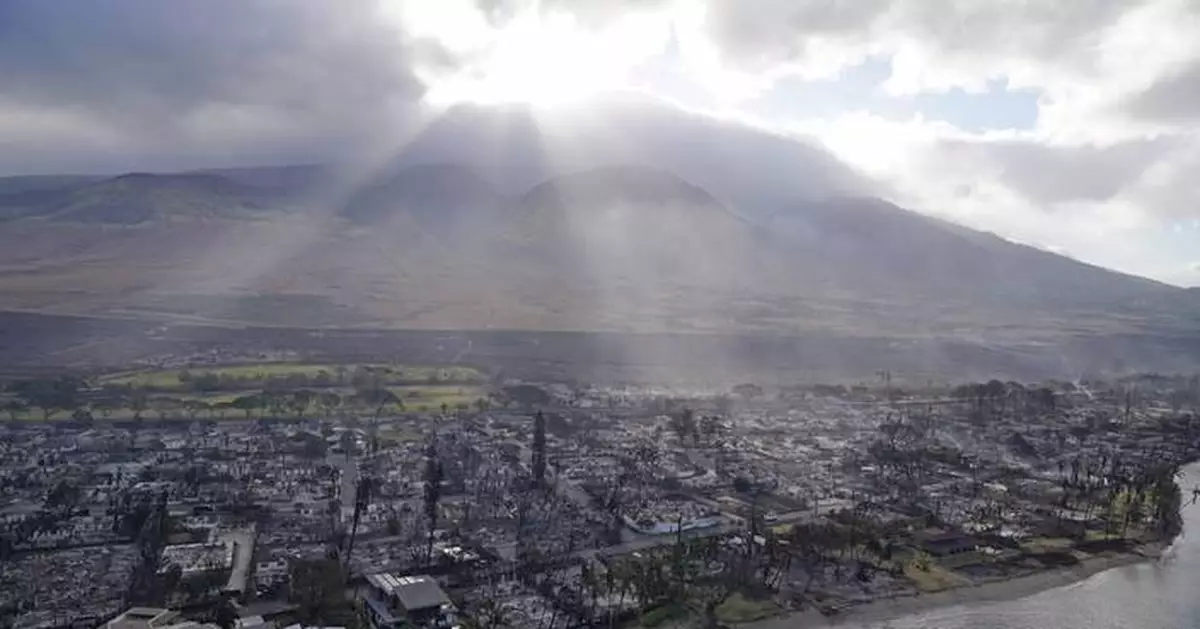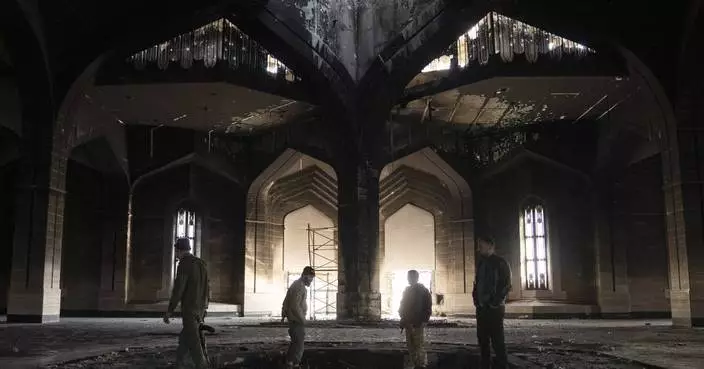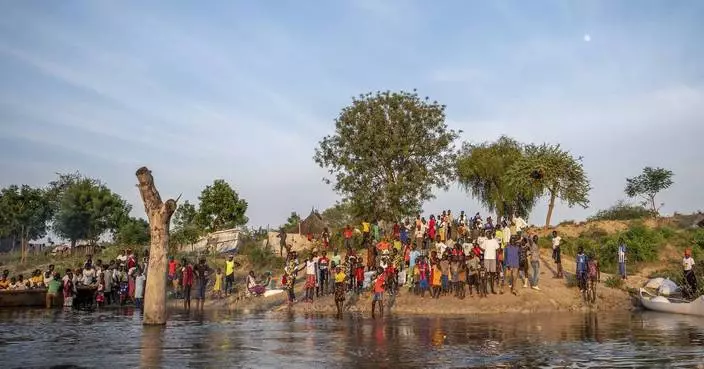HONOLULU (AP) — Hawaii officials didn't prepare for dangerous fire weather in the days before flames incinerated the historic Maui town of Lahaina even though they were warned by meteorologists, the state's attorney general said Friday.
The finding came in a 518-page report drafted for the attorney general by the Fire Safety Research Institute. It's the second of a three-part investigation aimed at understanding the tragedy and how best to avoid such disasters in the future.
The Aug. 8, 2023, wildfire was the deadliest U.S. wildfire in over a century.
Here's what to know:
Many didn't know the fire was threatening their seaside town. Powerful winds knocked out electricity, depriving people of internet, television and radio. Cell networks went down, so people couldn't exchange calls and texts or receive emergency alerts. Police delivered warnings door to door, but Maui County officials failed to sound emergency sirens telling residents to flee.
Many decided to leave upon smelling smoke and seeing flames. But they soon found themselves stuck in traffic after police closed key routes to protect people from live power lines toppled by high winds.
One family made it out by swerving around a barricade blocking Honoapiilani Highway, the main coastal road leading in and out of Lahaina. Some jumped in the ocean to escape the flames. Others died in their cars.
Maui police said 102 people died. Victims ranged in age from 7 to 97, but more than two-thirds were in their 60s or older, according to the Maui police. Two people are missing.
The toll surpassed that of the 2018 Camp Fire in northern California, which left 85 dead and destroyed the town of Paradise. A century earlier, the 1918 Cloquet Fire broke out in drought-stricken northern Minnesota, destroying thousands of homes and killing hundreds.
The Maui Fire Department will release a report on the origin and cause of the fire, which will include the results of an investigation led by the U.S. Bureau of Alcohol, Tobacco, Firearms and Explosives. A county spokesperson said the fire department hasn't yet received the ATF's findings.
Some queries have focused on a small, wind-whipped fire sparked by downed power lines early on Aug. 8. Firefighters declared it extinguished, but the blaze appears to have flared up hours later and turned into an inferno.
An Associated Press investigation found the answer may lie in an overgrown gully beneath Hawaiian Electric Co. power lines and something that harbored smoldering embers from the initial fire before rekindling.
Hawaiian Electric has acknowledged its downed lines caused the initial fire but has argued in court filings it couldn’t be responsible for the later flare-up because its lines had been turned off for hours by the time the fire reignited and spread through the town. The utility has instead blamed Maui fire officials for what it believes was their premature, false claim that they had extinguished the first fire. The county denies firefighters were negligent.
Thousands of Lahaina residents have sued various parties they believe to be at fault for the fire, including Hawaiian Electric, Maui County and the state of Hawaii.
Plaintiffs and defendants reached a $4 billion global settlement last month. It's not final because some parties have asked the Hawaii Supreme Court to weigh in on how insurance companies might be allowed go after Hawaiian Electric and others to recoup money they've already paid to policyholders to satisfy insurance claims.
The fire displaced about 12,000 people, most of them renters, upending a housing market already squeezed by a severe supply shortage.
The Federal Emergency Management Agency is helping 1,700 households pay rent. It's building modular homes for hundreds more alongside the state and nonprofit organizations.
Maui's mayor has proposed legislation that would force owners of 7,000 vacation rentals to rent to residents to free up housing for survivors. Some estimates say 1,500 households have left Maui as rents have soared.
The Army Corps of Engineers this month finished clearing debris from all 1,390 burned residential properties. Rebuilding has begun on 20 lots.
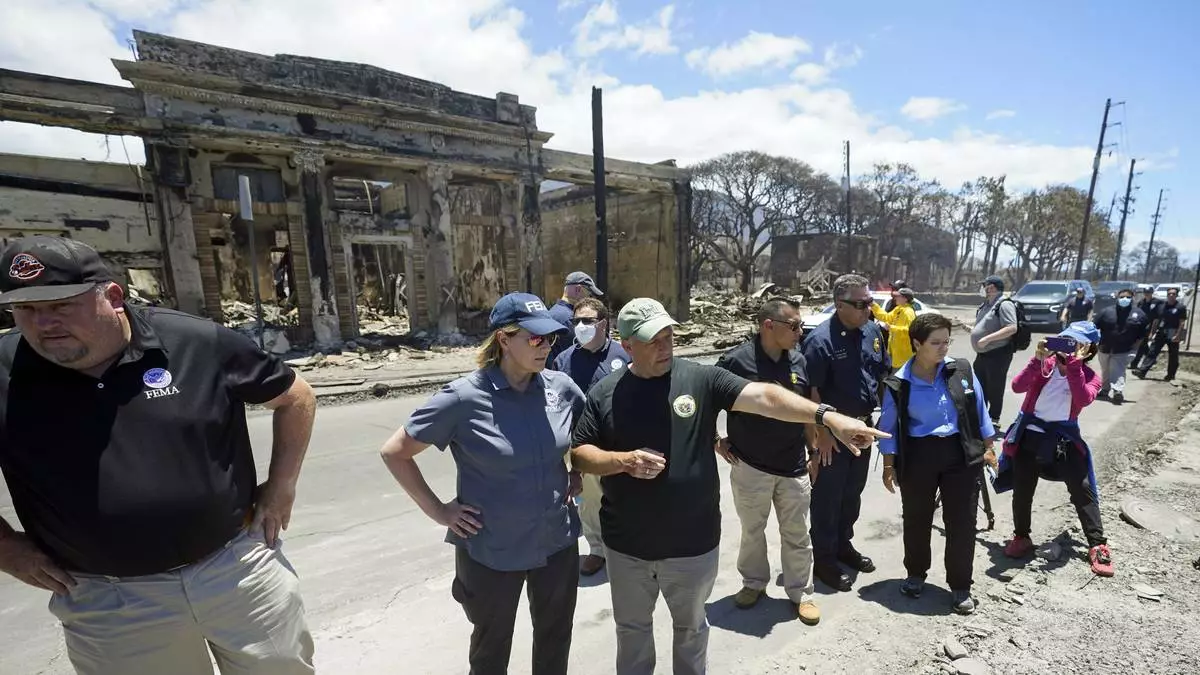
FILE - Hawaii Gov. Josh Green, center, points to damage as he speaks with Federal Emergency Management Agency Administrator Deanne Criswell during a tour of wildfire damage, Saturday, Aug. 12, 2023, in Lahaina, Hawaii. (AP Photo/Rick Bowmer, File)
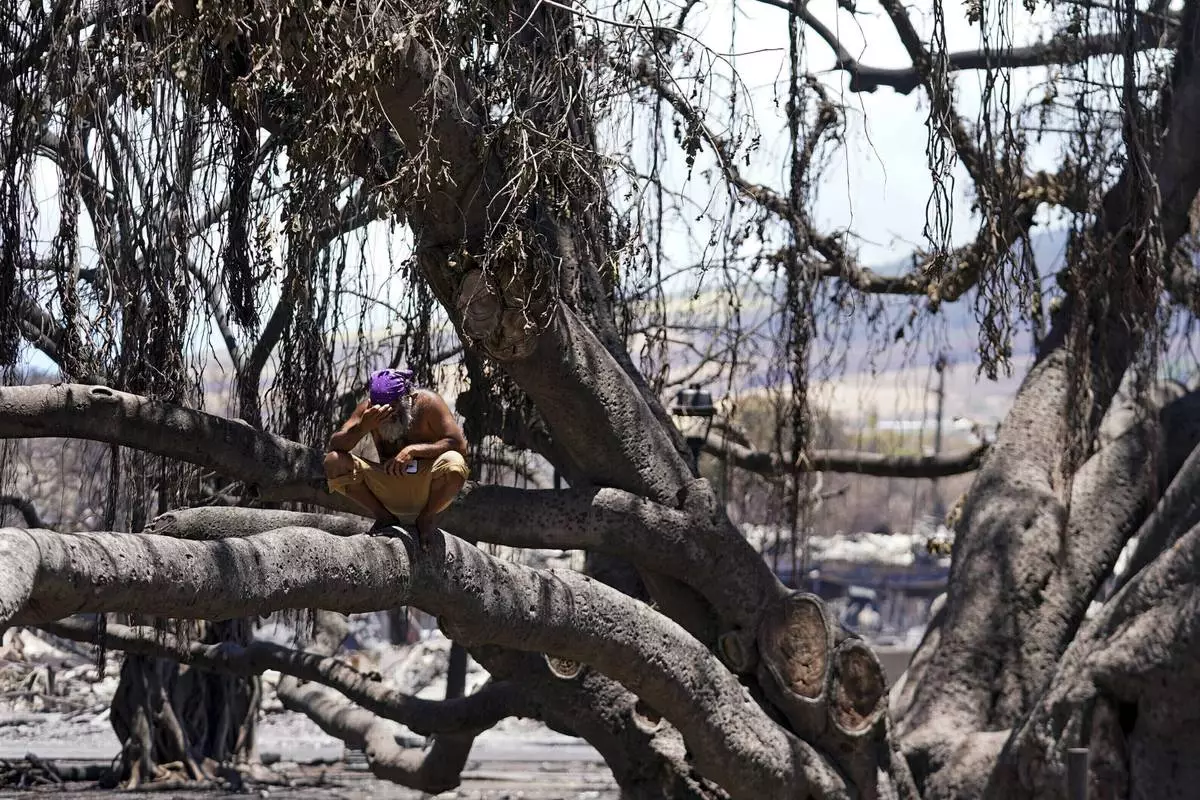
FILE - A man reacts as he sits on the Lahaina historic banyan tree damaged by a wildfire on Friday, Aug. 11, 2023, in Lahaina, Hawaii. (AP Photo/Rick Bowmer, File)
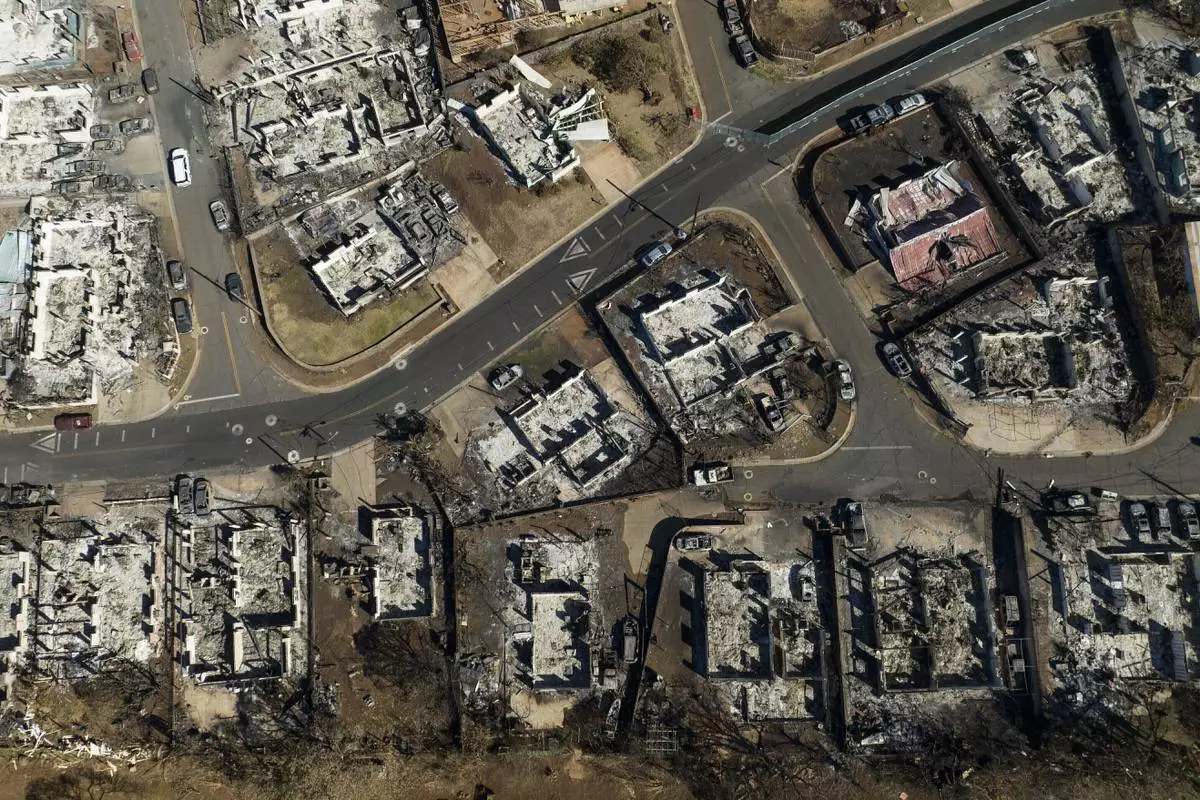
FILE - A general view shows the aftermath of a wildfire in Lahaina, Hawaii, on Aug. 17, 2023. (AP Photo/Jae C. Hong, File)
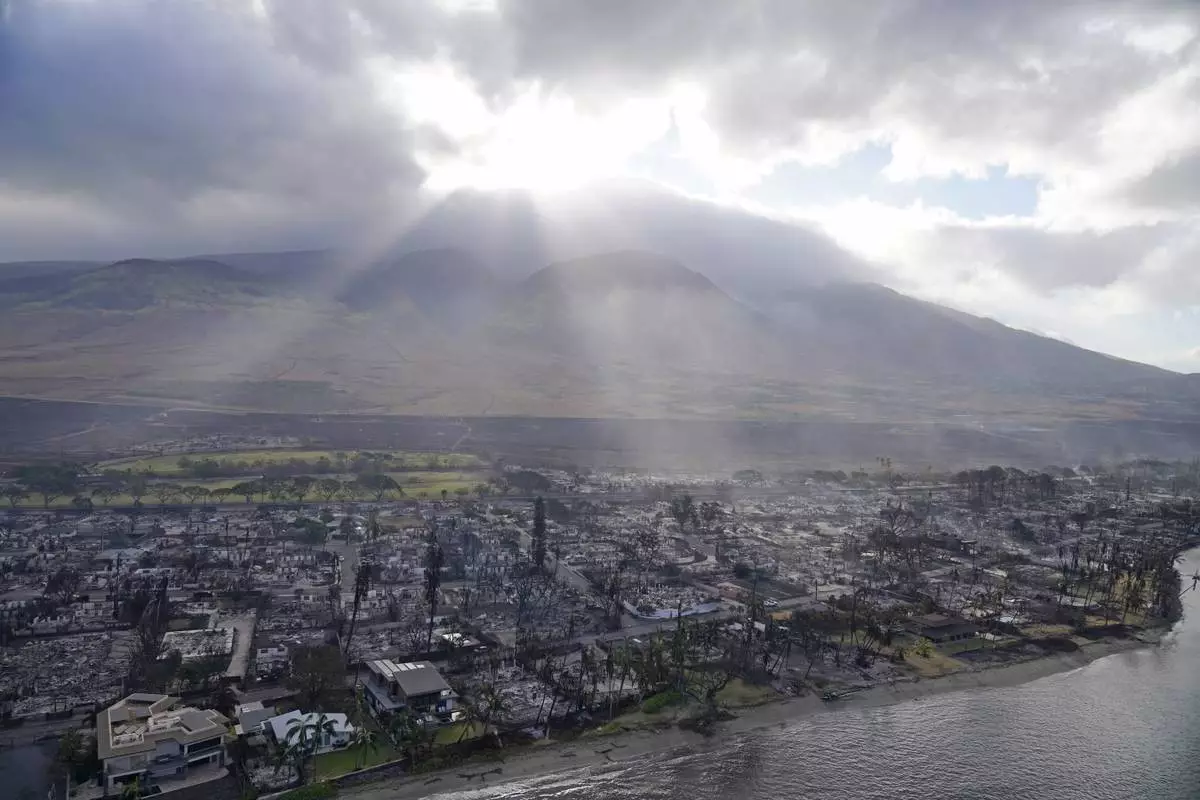
FILE - Rays of sunlight pierce through the clouds, Thursday, Aug. 10, 2023, above homes burned by wildfires in Lahaina, Hawaii. (AP Photo/Rick Bowmer, File)
KHAN YOUNIS, Gaza Strip (AP) — Winter is hitting the Gaza Strip and many of the nearly 2 million Palestinians displaced by the devastating 14-month war with Israel are struggling to protect themselves from the wind, cold and rain.
There is a shortage of blankets and warm clothing, little wood for fires, and the tents and patched-together tarps families are living in have grown increasingly threadbare after months of heavy use, according to aid workers and residents.
Shadia Aiyada, who was displaced from the southern city of Rafah to the coastal area of Muwasi, has only one blanket and a hot water bottle to keep her eight children from shivering inside their fragile tent.
“We get scared every time we learn from the weather forecast that rainy and windy days are coming up because our tents are lifted with the wind. We fear that strong windy weather would knock out our tents one day while we’re inside,” she said.
With nighttime temperatures that can drop into the 40s (the mid-to-high single digits Celsius), Aiyada fears that her kids will get sick without warm clothing.
When they fled their home, her children only had their summer clothes, she said. They have been forced to borrow some from relatives and friends to keep warm.
The United Nations warns of people living in precarious makeshift shelters that might not survive the winter. At least 945,000 people need winterization supplies, which have become prohibitively expensive in Gaza, the U.N. said in an update Tuesday. The U.N. also fears infectious disease, which spiked last winter, will climb again amid rising malnutrition.
The U.N. Agency for Palestinian Refugees, known as UNRWA, has been planning all year for winter in Gaza, but the aid it was able to get into the territory is “not even close to being enough for people,” said Louise Wateridge, an agency spokeswoman.
UNRWA distributed 6,000 tents over the past four weeks in northern Gaza but was unable to get them to other parts of the Strip, including areas where there has been fighting. About 22,000 tents have been stuck in Jordan and 600,000 blankets and 33 truckloads of mattresses have been sitting in Egypt since the summer because the agency doesn’t have Israeli approval or a safe route to bring them into Gaza and because it had to prioritize desperately needed food aid, Wateridge said.
Many of the mattresses and blankets have since been looted or destroyed by the weather and rodents, she said.
The International Rescue Committee is struggling to bring in children’s winter clothing because there “are a lot of approvals to get from relevant authorities,” said Dionne Wong, the organization’s deputy director of programs for the occupied Palestinian territories.
“The ability for Palestinians to prepare for winter is essentially very limited,” Wong said.
The Israeli government agency responsible for coordinating aid shipments into Gaza said in a statement that Israel has worked for months with international organizations to prepare Gaza for the winter, including facilitating the shipment of heaters, warm clothing, tents and blankets into the territory.
More than 45,000 Palestinians have been killed in the war in Gaza, according to the Gaza Health Ministry. The ministry's count doesn't distinguish between civilians and combatants, but it has said more than half of the fatalities are women and children. The Israeli military says it has killed more than 17,000 militants, without providing evidence.
The war was sparked by Hamas’ October 2023 attack on southern Israel, where the militant group killed 1,200 people and took 250 hostages in Gaza.
Negotiators say Israel and Hamas are inching toward a ceasefire deal, which would include a surge in aid into the territory.
For now, the winter clothing for sale in Gaza's markets is far too expensive for most people to afford, residents and aid workers said.
Reda Abu Zarada, 50, who was displaced from northern Gaza with her family, said the adults sleep with the children in their arms to keep them warm inside their tent.
“Rats walk on us at night because we don’t have doors and tents are torn. The blankets don’t keep us warm. We feel frost coming out from the ground. We wake up freezing in the morning,” she said. “I’m scared of waking up one day to find one of the children frozen to death.”
On Thursday night, she fought through knee pain exacerbated by cold weather to fry zucchini over a fire made of paper and cardboard scraps outside their tent. She hoped the small meal would warm the children before bed.
Omar Shabet, who is displaced from Gaza City and staying with his three children, feared that lighting a fire outside his tent would make his family a target for Israeli warplanes.
“We go inside our tents after sunset and don’t go out because it is very cold and it gets colder by midnight,” he said. “My 7-year-old daughter almost cries at night because of how cold she is.”
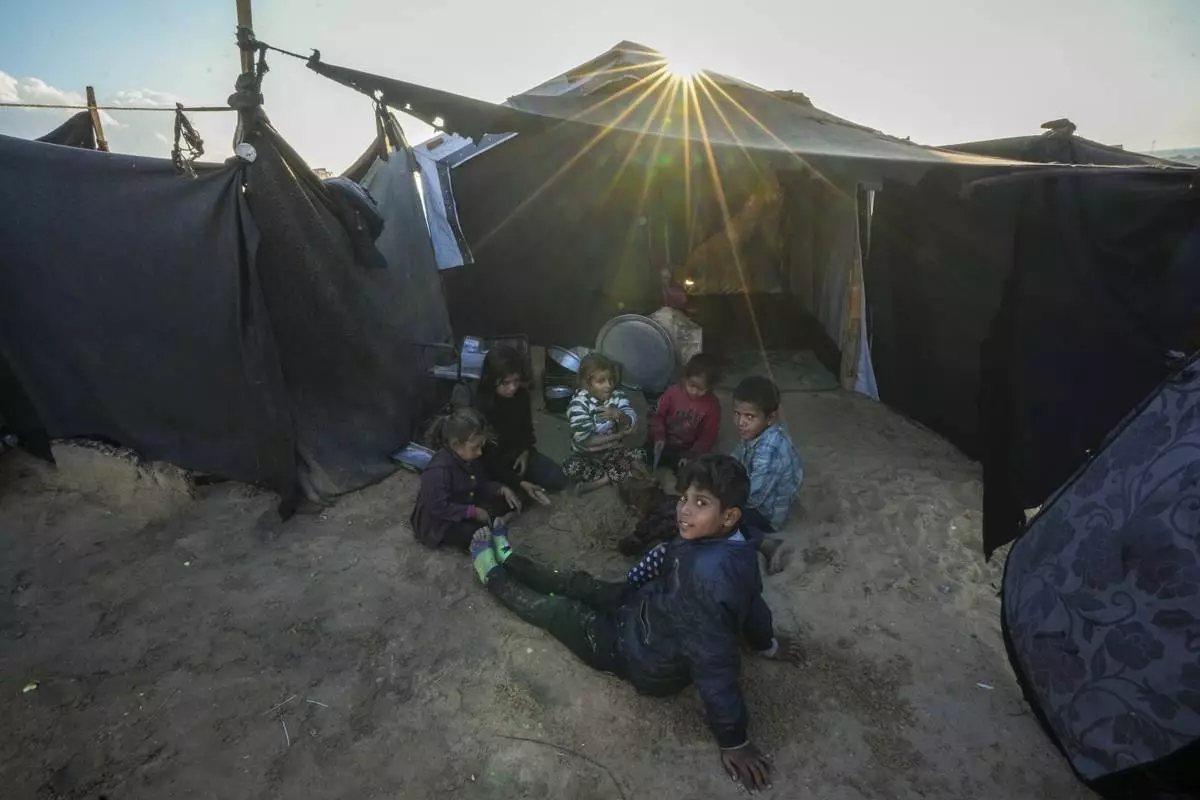
Grandchildren of Reda Abu Zarada, displaced from Jabaliya in northern Gaza, play next to their tent at a camp in Khan Younis, Gaza Strip, Thursday, Dec. 19, 2024. (AP Photo/Abdel Kareem Hana)
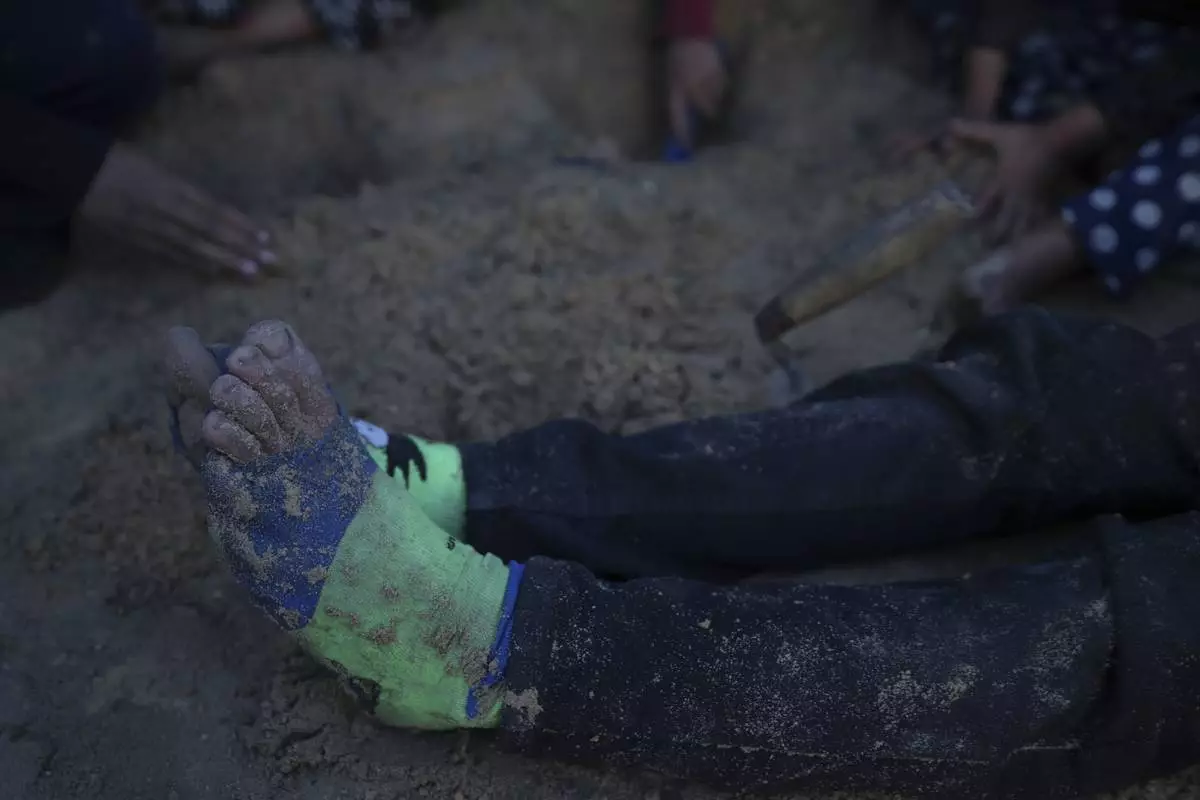
One of Reda Abu Zarada's grandchildren, displaced from Jabaliya in northern Gaza, sits on the dirt wearing torn socks while playing near their tent at a camp in Khan Younis, Gaza Strip, Thursday Dec. 19, 2024. (AP Photo/Abdel Kareem Hana)
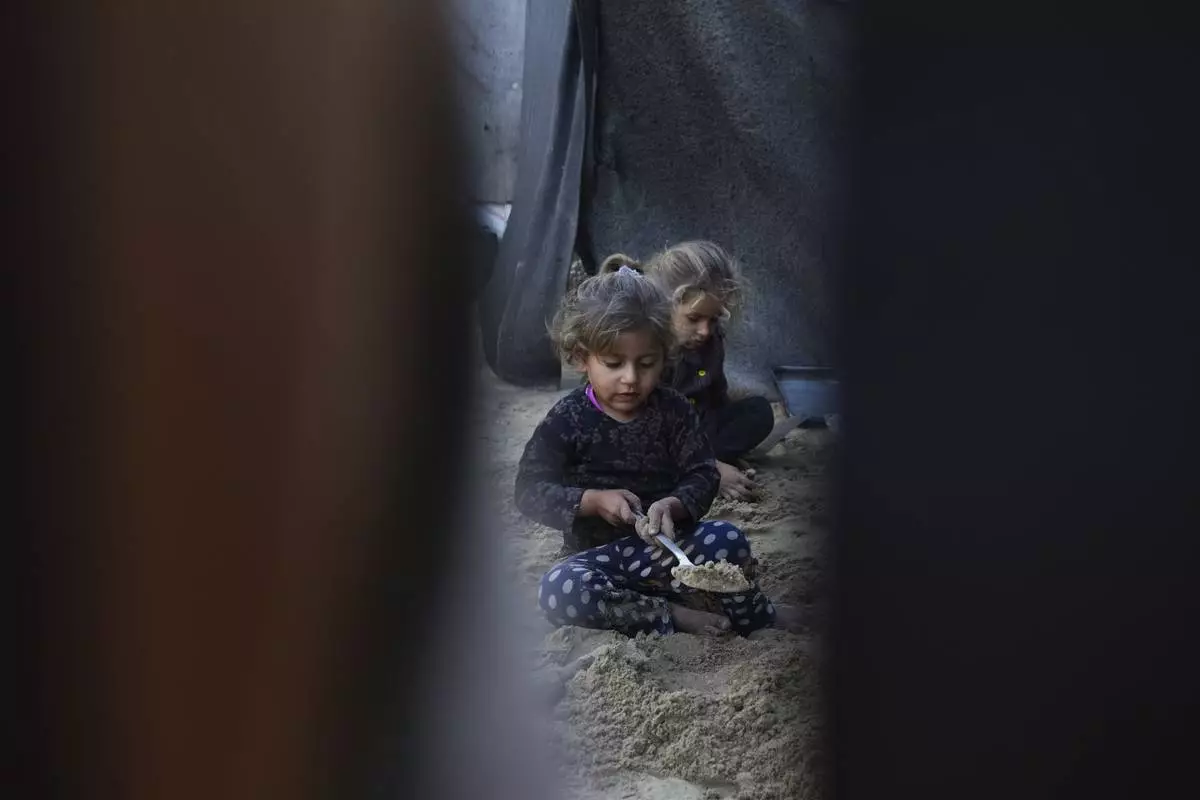
Grandchildren of Reda Abu Zarada, displaced from Jabaliya in northern Gaza, play with sand next to their tent at a camp in Khan Younis, Gaza Strip, Thursday, Dec. 19, 2024. (AP Photo/Abdel Kareem Hana)
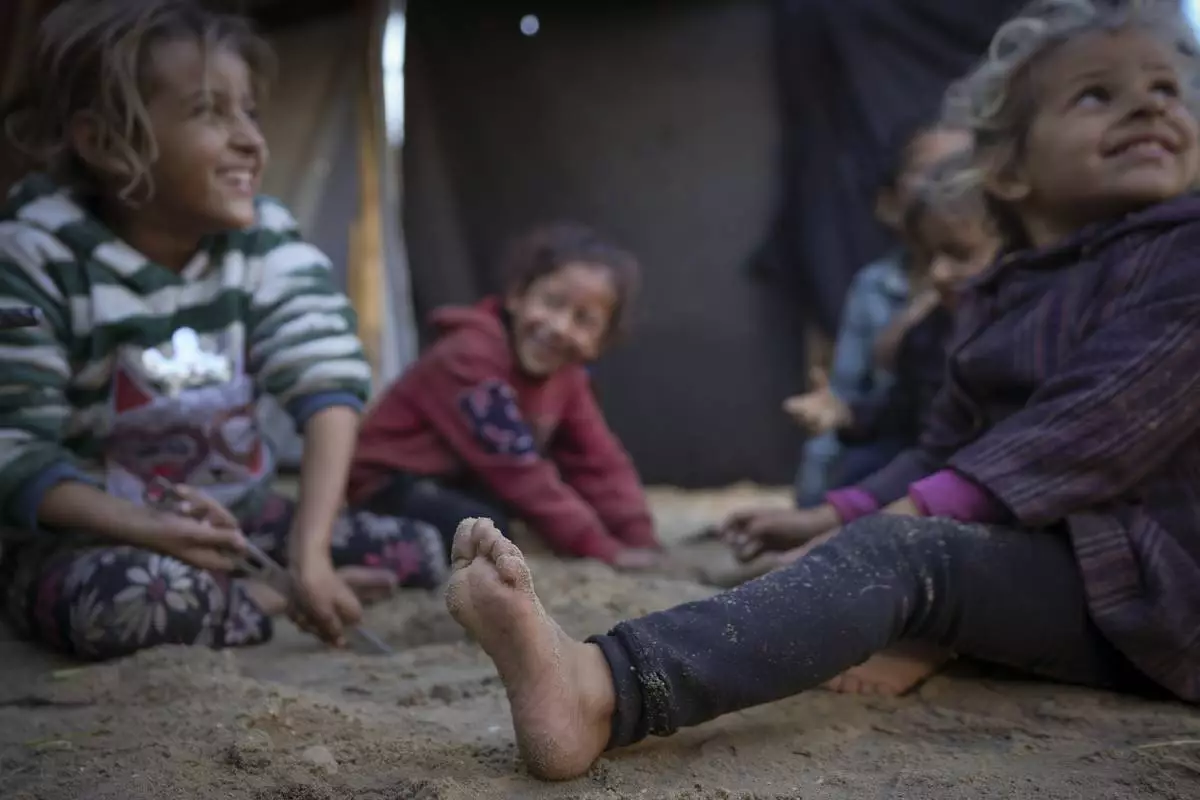
Grandchildren of Reda Abu Zarada, displaced from Jabaliya in northern Gaza, play next to their tent at a camp in Khan Younis, Gaza Strip, Thursday, Dec. 19, 2024. (AP Photo/Abdel Kareem Hana)
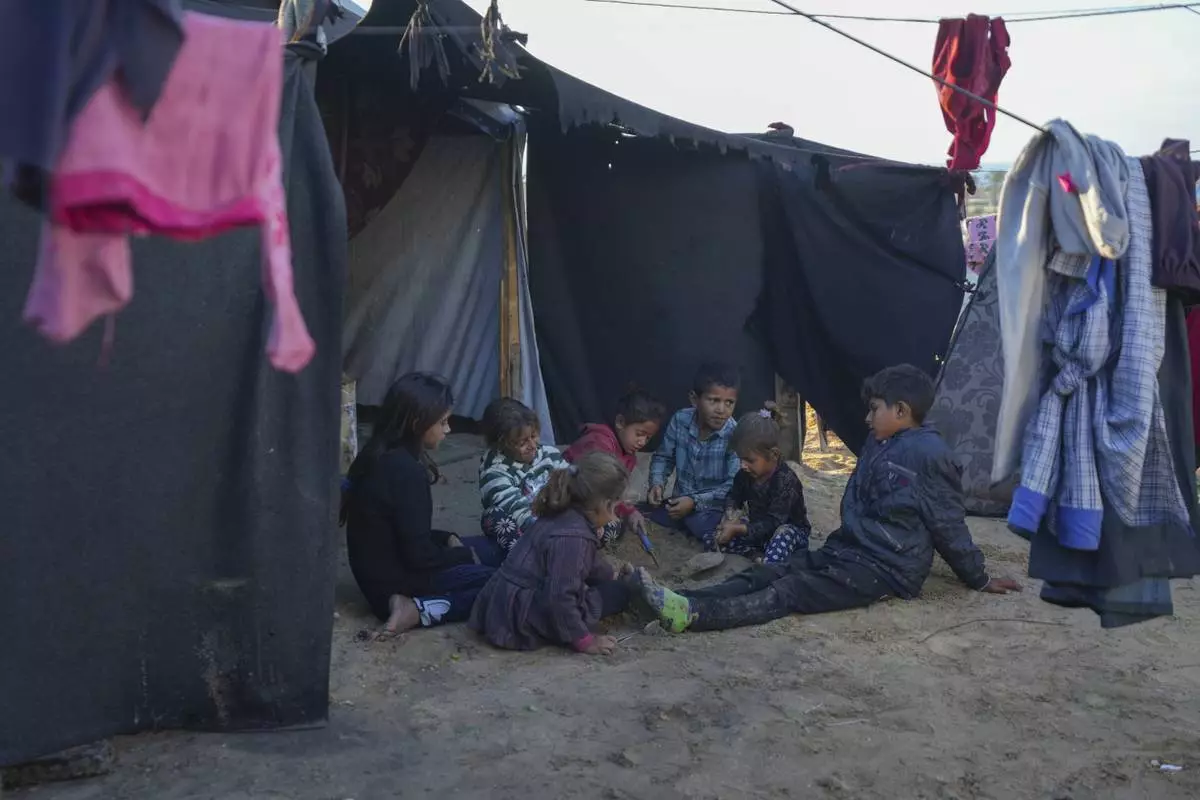
Grandchildren of Reda Abu Zarada, displaced from Jabaliya in northern Gaza, play next to their tent at a camp in Khan Younis, Gaza Strip, Thursday, Dec. 19, 2024. (AP Photo/Abdel Kareem Hana)
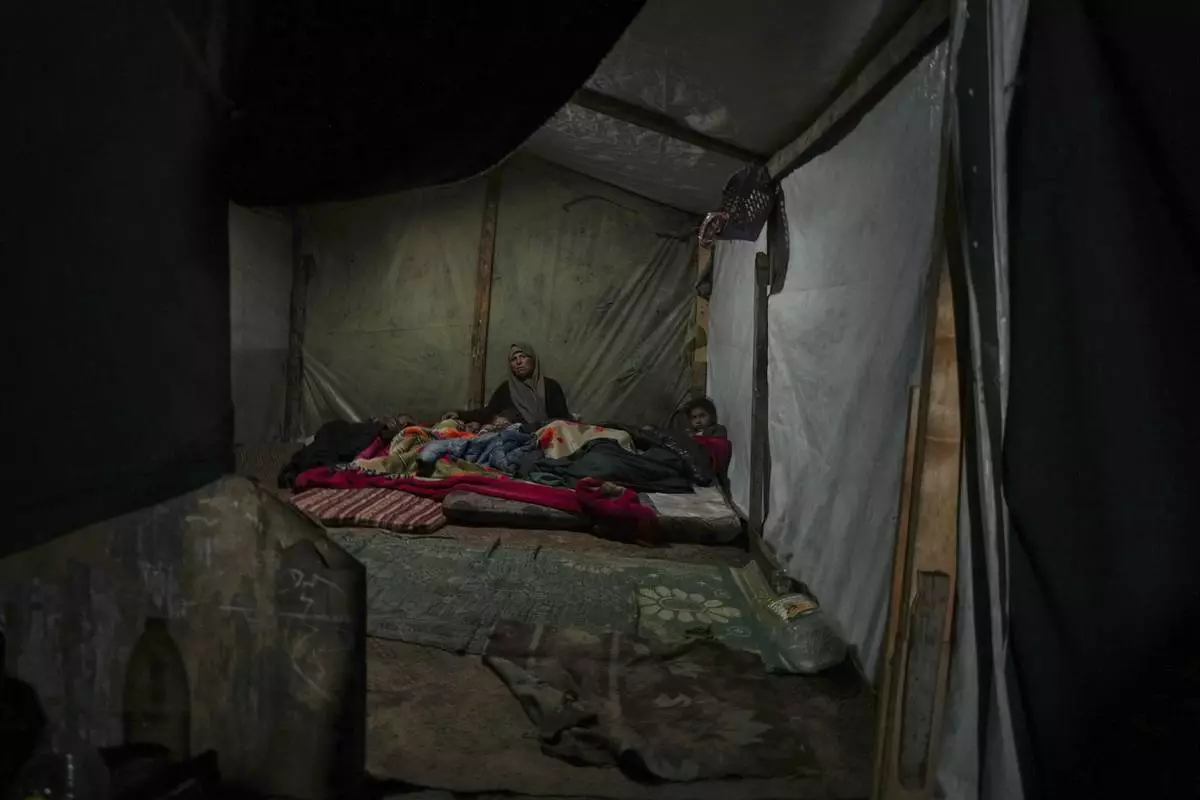
Reda Abu Zarada wraps herself and her grandchildren in blankets as they prepare to sleep in their tent at a camp in Khan Younis, Gaza Strip, Thursday, Dec. 19, 2024. (AP Photo/Abdel Kareem Hana)
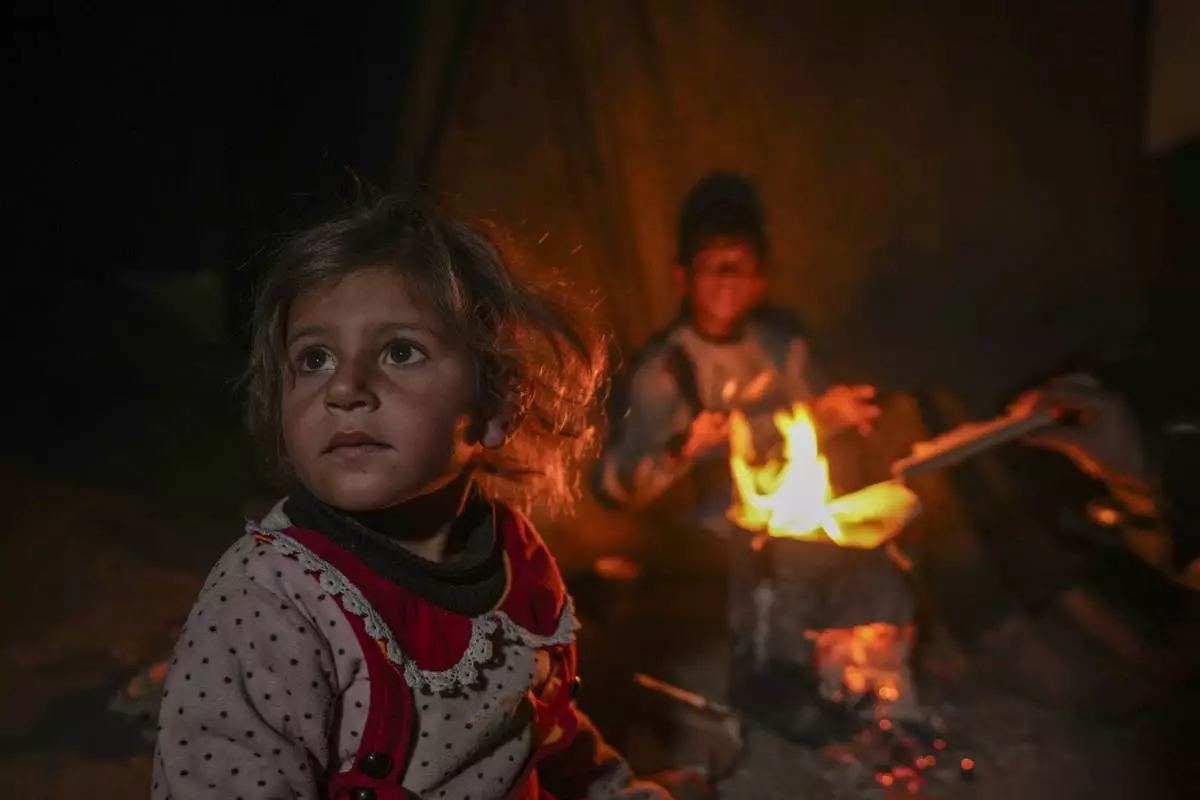
The grandchildren of Reda Abu Zarada sit by a fire at a camp by the sea in Khan Younis, Gaza Strip, Thursday, Dec. 19, 2024. (AP Photo/Abdel Kareem Hana)
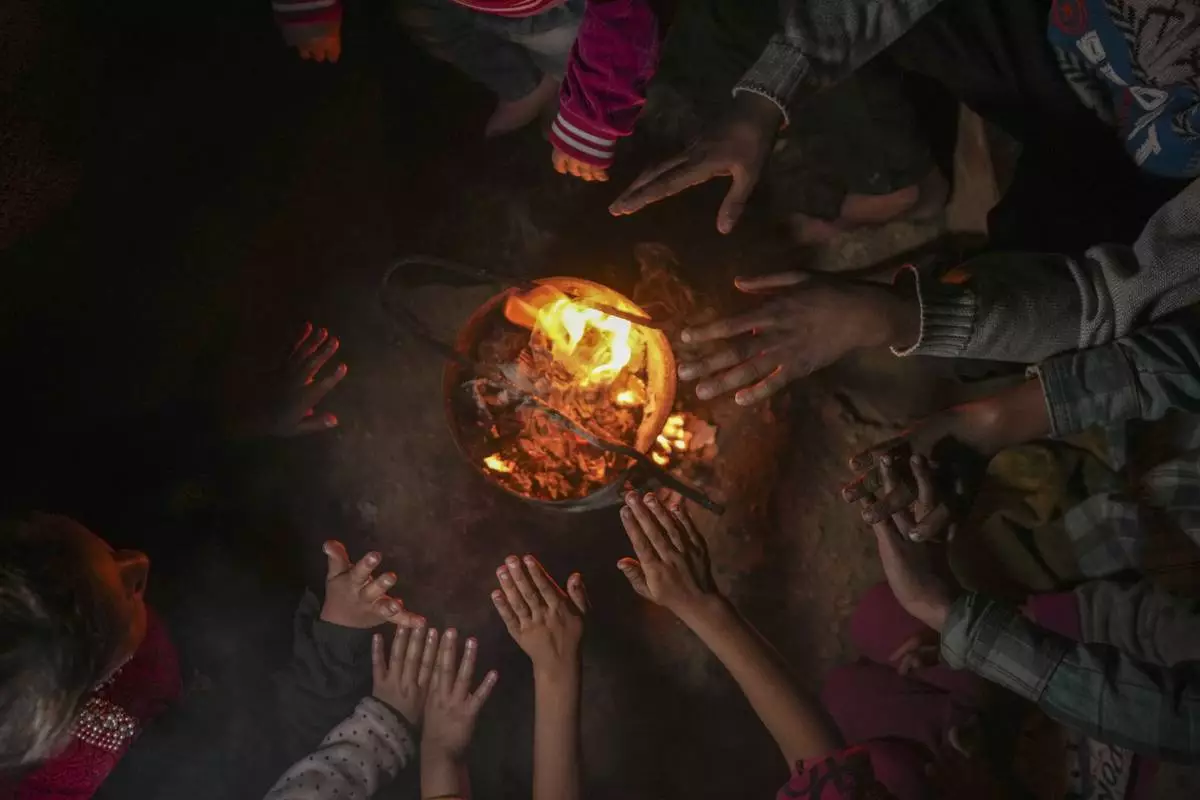
Reda Abu Zarada, 50, displaced from Jabaliya in northern Gaza, warms up by a fire with her grandchildren at a camp in Khan Younis, Gaza Strip, Thursday, Dec. 19, 2024. (AP Photo/Abdel Kareem Hana)
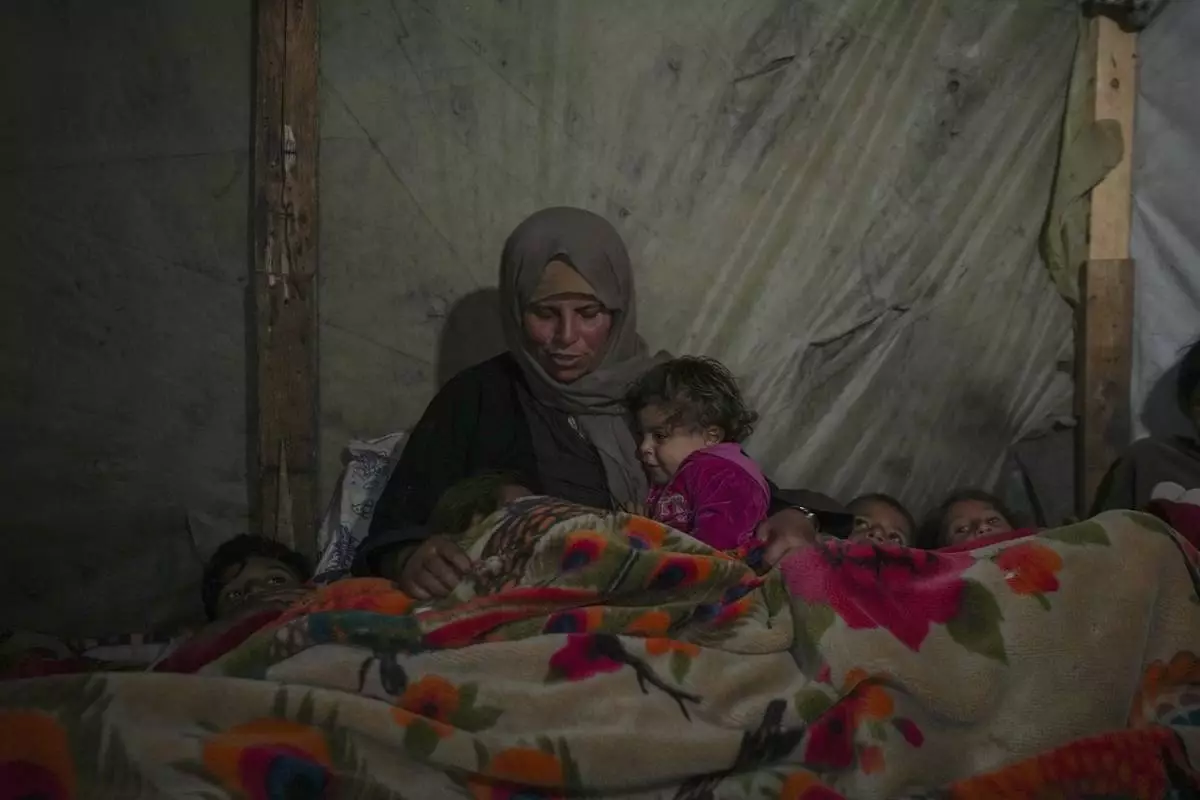
Reda Abu Zarada wraps herself and her grandchildren in blankets as they prepare to sleep in their tent at a camp in Khan Younis, Gaza Strip, Thursday Dec. 19, 2024. (AP Photo/Abdel Kareem Hana)
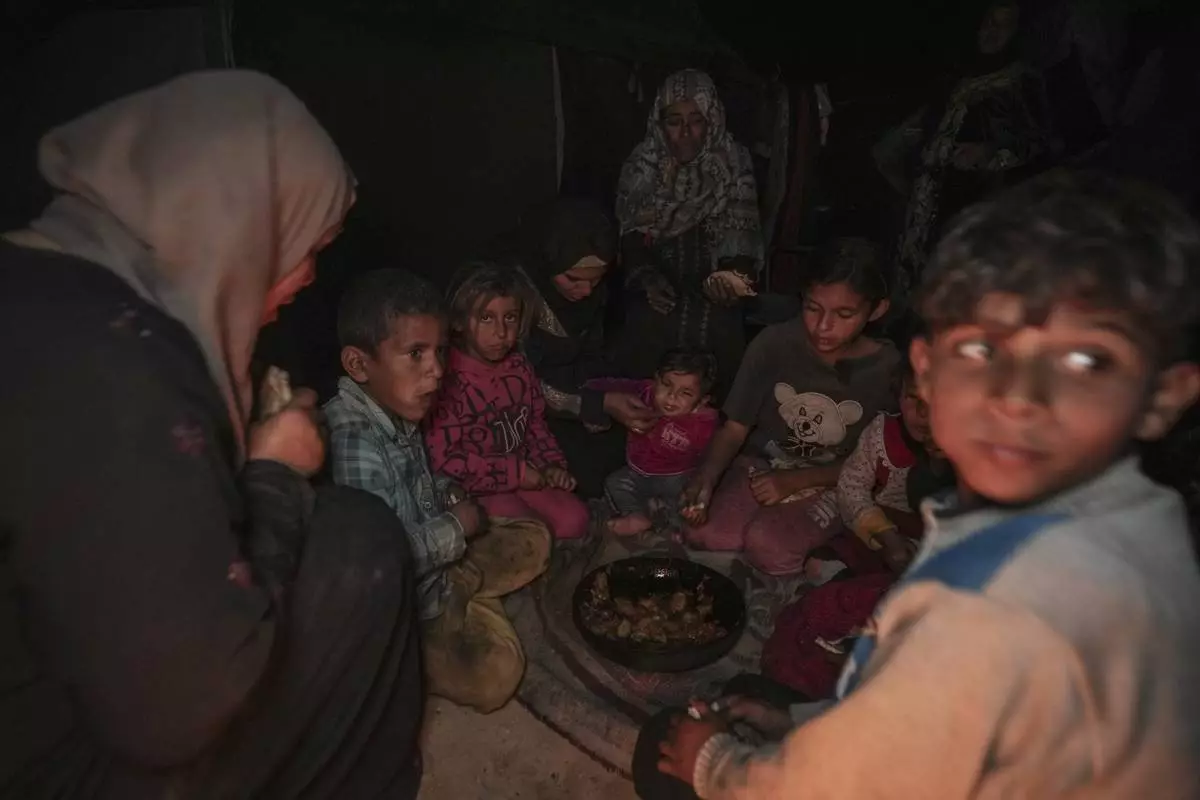
Amani Abu Zarada, fourth from left, feeds one of her children with fried zucchini made over a fire made of paper and cardboard scraps outside their tent in a camp in Khan Younis, Gaza Strip, Thursday, Dec. 19, 2024. (AP Photo/Abdel Kareem Hana)
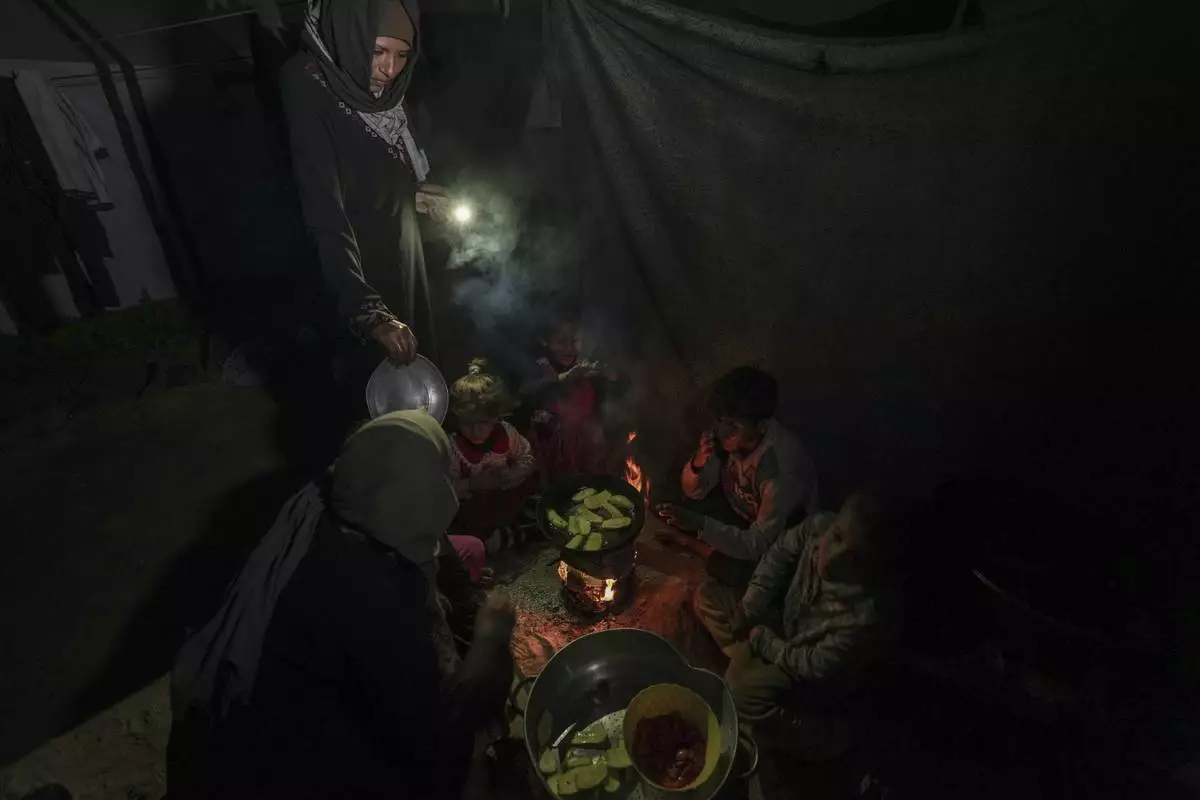
Reda Abu Zarada, left, and her daughter, Amani, standing, displaced from Jabaliya in northern Gaza, feed their children and grandchildren with fried zucchini made over a fire made of paper and cardboard scraps outside their tent in a camp in Khan Younis, Gaza Strip, Thursday, Dec. 19, 2024. (AP Photo/Abdel Kareem Hana)
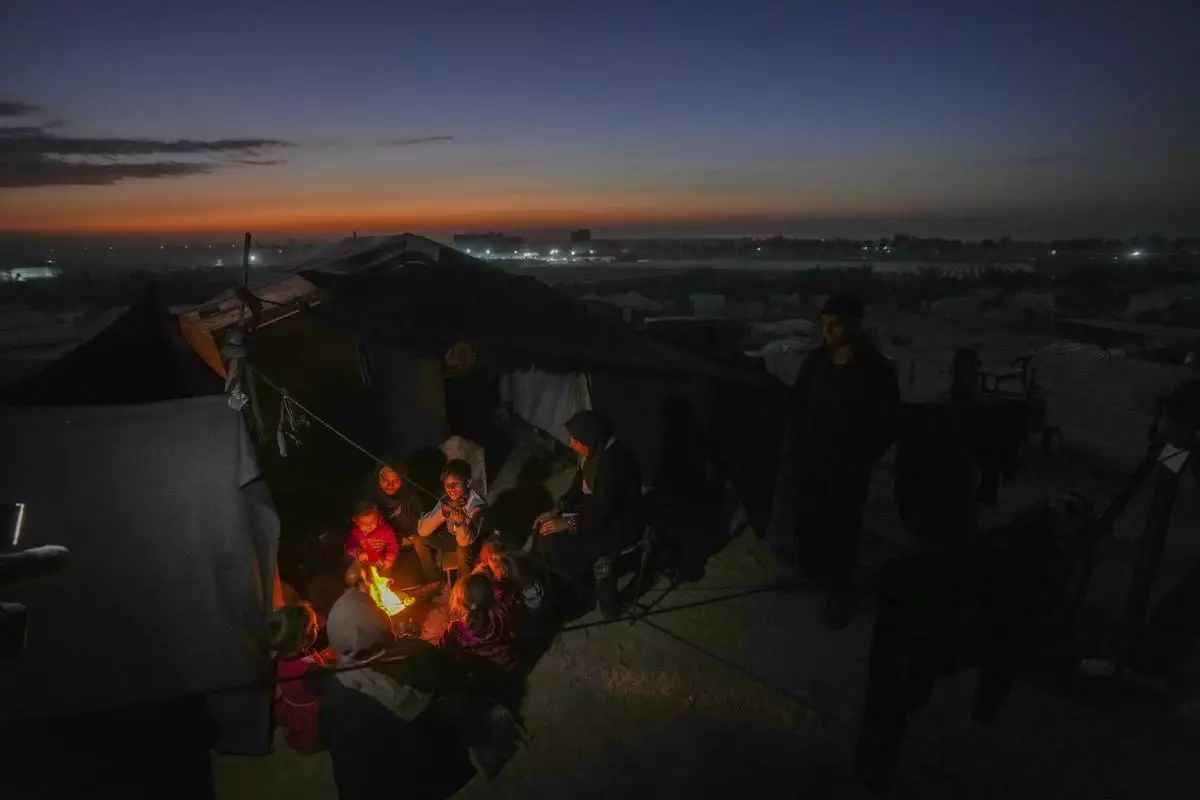
Reda Abu Zarada, 50, displaced from Jabaliya in nothern Gaza, sits by a fire with her grandchildren at a camp by the sea in Khan Younis, Gaza Strip, Thursday, Dec. 19, 2024. (AP Photo/Abdel Kareem Hana)






